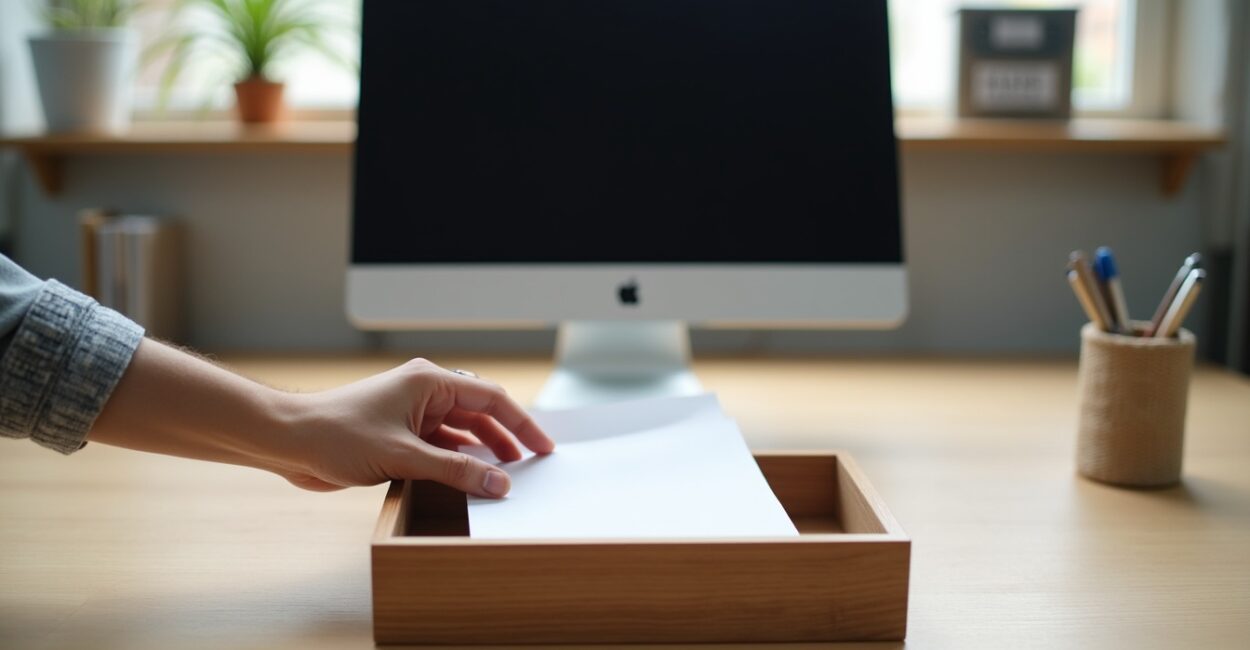Warning: Cannot modify header information - headers already sent in /home/u278635817/domains/myhousegarden.com/public_html/wp-content/plugins/artigosgpt/artigosgpt.php on line 28454
Feeling overwhelmed by a desk that looks like a paper avalanche? Office organization can transform stress into calm, reclaiming focus and joy in minutes.
Today, tidy workspaces are linked to productivity, wellbeing, and clarity. This guide shows practical steps—like adopting a single-desk inbox and adding monitor arms (e.g., Ergotron)—to cut visual clutter.
You’ll discover clear strategies, quick setups, and evidence-backed tips for beautiful, efficient office organization that help you work smarter and feel better.
Declutter Foundations: Clear the Visual Noise
Start with a clean surface
Remove everything from your desk and sort by use. Prioritize daily essentials and set aside rarely used items for storage.
Clearing creates mental space, reduces distractions, and supports focused work. Office organization begins with visible surfaces.
Adopt a single-desk inbox
Choose one tray or shallow box for incoming paper and items. A single-desk inbox prevents scattered stacks and decision fatigue.
Process the inbox daily: file, act, or toss. This small habit anchors your office organization and keeps priorities visible.
Optimize Ergonomics and Sightlines
Mount monitors with arms
Use monitor arms like Ergotron to lift screens off the desk and free up space beneath. This reduces visual clutter dramatically.
Adjust height and tilt for neutral neck posture. Improved ergonomics supports comfort and longer, healthier work sessions.
Create clear sightlines
Position frequently used items within reach and less-used items out of sight. A tidy peripheral field reduces cognitive load and stress.
Good sightlines improve concentration and support a minimalist, purposeful aesthetic in your office organization strategy.

Smart Storage and Labeling
Choose closed storage solutions
Use drawers, cabinets, or boxes to hide cables and supplies. Concealed storage keeps surfaces calm and reduces visual clutter.
Group items by task—tech, paper, art supplies—to speed retrieval and reinforce a tidy workflow.
Label for fast retrieval
Clear labels on drawers and containers save time and reduce frustration. Consistency in labeling boosts habit formation and order.
Label systems also help teams maintain shared spaces, improving collective office organization and reducing misplacement.
Workflow Design for Productivity
Map your task zones
Designate areas for focused work, reference materials, and quick tasks. Zoning reduces task-switching and improves rhythm.
Keep reference materials in a nearby shelf and active projects in your single-desk inbox for efficient processing.
Implement a daily reset routine
Spend five minutes at day’s end to clear your desk, sort the inbox, and prep priorities. Small rituals sustain organization.
Consistent resets prevent clutter buildup and make the next morning calmer and more productive.
Tools, Tech, and Minimalist Gear
Essential tools to buy
- Install a monitor arm to lift screens.
- Get a shallow single-desk inbox tray.
- Choose a cable organizer to hide wires.
- Buy matching containers to unify the look.
Tech habits that save space
Go digital where possible: scan receipts and use cloud storage. Reducing paper naturally improves office organization.
Use wireless peripherals to minimize cords and choose compact chargers to keep your desk surface minimal.
Style and Sustainability
Design with calm colors
Neutral palettes and limited contrasts reduce visual noise and foster relaxation. Style supports functionality and focus.
Choose materials that age well and create a warm, enduring workspace aligned with your aesthetics.
Adopt sustainable choices
Buy durable gear like an Ergotron monitor arm and repair before replace. Sustainable choices lower waste.
Repurpose storage containers and donate unneeded items to reduce environmental impact while maintaining order.
Maintenance, Habits, and Team Adoption
Daily habits that stick
Process your single-desk inbox each morning. Spend ten minutes on quick wins to prevent clutter reappearing overnight.
Consistent micro-habits form a tidy environment. Office organization becomes effortless with tiny, repeated actions.
Get buy-in from colleagues
Share simple standards for shared spaces and label communal storage. Clear expectations keep team areas functional and calm.
Run short training or a tidy challenge to build momentum; collective routines amplify individual office organization improvements.
Conclusion
Office organization is less about perfection and more about humane systems that reduce stress and boost focus. Small changes—like a single-desk inbox and monitor arms—deliver big emotional returns.
Start with one habit today, and you’ll feel the relief tomorrow. Reclaim your desk, your attention, and the joy of work.
Faq
How quickly will I see benefits from reorganizing my desk?
Most people notice psychological relief immediately after decluttering, with productivity gains appearing within days. Establishing a daily reset and adopting a single-desk inbox plus monitor arms helps sustain calm. Over weeks, improved ergonomics and fewer distractions translate into clearer focus, reduced fatigue, and better work output consistently.
Are monitor arms like Ergotron worth the investment?
Monitor arms provide ergonomic benefits, free desk space, and a cleaner visual field. For many, the initial cost pays off via improved posture and productivity. Choose reputable brands for durability. When paired with cable management and a tidy inbox, an arm can transform both comfort and office organization long-term.
What should go in my single-desk inbox each day?
Your single-desk inbox should hold new mail, active project papers, and items requiring immediate action. Process it daily: file, act, or discard. Keep the inbox shallow to force frequent processing, and combine it with quick digital scans for documents to minimize paper accumulation while maintaining excellent office organization.
How can teams maintain shared workspace organization?
Set simple, visible rules for shared zones and provide labeled storage. Schedule brief weekly resets and encourage responsibility for communal gear. Use standardized containers and monitor arms where possible to reduce clutter. Regular communication and small rituals help teams sustain tidy, functional spaces that support collective productivity.
Can I be eco-friendly while improving office organization?
Absolutely. Choose durable items, repair instead of replace, and donate unneeded equipment. Go paperless where possible and reuse containers. Sustainable choices like long-lasting monitor arms and recycled storage help maintain order while lowering environmental impact, aligning neatness with responsible consumption and office organization values.
References: Ergotron, Harvard Business Review.







